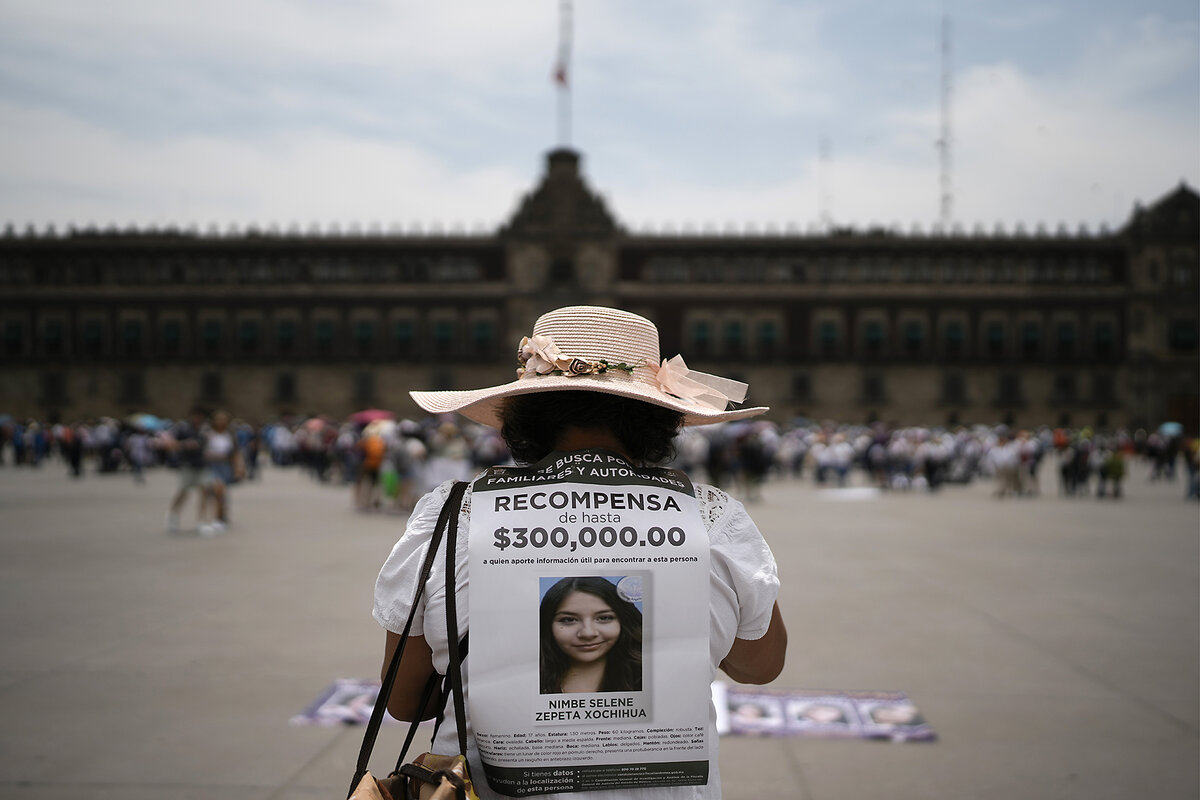Mexico elects its first female president. Her real challenges lie ahead.
Loading...
| Mexico City
Claudia Sheinbaum Pardo, Mexico’s new president-elect, has broken the ultimate glass ceiling in a country more commonly known for its machismo.
The economic policies of her predecessor, outgoing President Andrés Manuel López Obrador, who is known popularly as AMLO, helped her reach this milestone. Millions of Mexicans were lifted out of poverty under his six-year term, and many want more of the same.
Why We Wrote This
Mexico’s new female president is walking a crossroads with her nation. Buoyed by the popular economic policies of her predecessor and riding a wave of enthusiasm for women’s rights, she also faces enormous hurdles.
But AMLO also faces criticism that he has rolled back democracy, and his efforts to fight organized crime have been met with mixed results. Dr. Sheinbaum, a climate scientist and the former mayor of Mexico City, will have to address leadership that has polarized the nation, at a time of record violence. Double standards for women leaders will also certainly come into play for the new president.
“She can stand her ground. But you can’t ignore she is arriving in the shadow of AMLO,” says Lila Abed, acting director of the Wilson Center’s Mexico Institute, in Washington, of the president-elect.
“She will face a very difficult security and economic situation, climate change, water shortages, heat waves,” she adds. “It’s going to be a very difficult country she’s going to lead.”
Claudia Sheinbaum Pardo’s decisive win in Mexico is a milestone for women and an endorsement of the populist political project of the nation over the past six years.
But the same forces that propelled Mexico’s first female president to office could also pull her back, as she faces a polarized society, record levels of violence, concerns over democratic rollbacks, and the double standards that many women leaders around the globe must navigate once they become heads of state.
The climate scientist and former Mexico City mayor won about 60% of the vote, according to preliminary results, a wider margin than expected.
Why We Wrote This
Mexico’s new female president is walking a crossroads with her nation. Buoyed by the popular economic policies of her predecessor and riding a wave of enthusiasm for women’s rights, she also faces enormous hurdles.
Buoyed by the popularity of her charismatic predecessor, President Andrés Manuel López Obrador, who is known popularly as AMLO, Dr. Sheinbaum will have to both continue his poverty alleviation policies to maintain support and fight to stake her own political space.
“She can stand her ground. But you can’t ignore she is arriving in the shadow of AMLO,” says Lila Abed, acting director of the Wilson Center’s Mexico Institute, in Washington, of the president-elect.
“She will face a very difficult security and economic situation, climate change, water shortages, heat waves,” she adds. “It’s going to be a very difficult country she’s going to lead.”
The president-elect has expressed blanket support for the continuation of the political agenda launched by AMLO, who leaves office with approval ratings of over 60%. She promised to build the “second floor” onto his government transformation plan, which has leaned into poverty alleviation with mixed results.
AMLO’s administration ditched a number of long-standing social programs, replacing them with his party’s own, and increased social spending overall – particularly for older adults, students, unemployed youth, and farmers. But despite the higher spending, the universal nature of his social programs has translated to the poorest Mexicans receiving less financial support than they did under previous governments.
Despite high levels of personal appeal, Mr. López Obrador also leaves office with many concerned about his heavy reliance on the military to fulfill traditionally civilian-led duties, and his pending proposals to change the constitution in ways critics find concerning for Mexico’s democratic health.
In her acceptance speech early Monday morning, Dr. Sheinbaum promised to “walk in peace and harmony to continue building a fair and more prosperous Mexico.”
Dr. Sheinbaum also gave a nod to a historic moment for women in Mexico, which saw two women as the leading candidates on the ballot.
“For the first time in 200 years of the republic, I will become the first female president of Mexico,” she said. “I do not arrive alone. We all got here, with our heroines who gave us our homeland, with our ancestors, our mothers, our daughters, and our granddaughters.”
Political activism
Dr. Sheinbaum, the granddaughter of Jewish immigrants, grew up in a leftist, politically active, and intellectual family. Her mother is a biochemist, and her father a chemical engineer. They protested in the brazen 1968 military massacre of student demonstrators in Mexico City.
“I was brought up with ... a belief that politics can transform the world alongside an academic and scientific mindset,” Dr. Sheinbaum said in a 2023 documentary directed by her son.
Dr. Sheinbaum first joined a political movement when she was 15 years old. It was in support of mothers searching for children who went missing at the hands of government repression. She was an active part of university student demonstrations in the late 1980s speaking out against rising tuition, arguing that education was a right – not a commodity. Her participation grew as Mexico’s ruling Institutional Revolutionary Party, which held exclusive control of the government between 1929 and 2000, began to show fissures.
She has a long track record of successful public service, working as secretary of environment in the Mexico City government from 2000 to 2006, and as mayor from 2018 until just last year. She dramatically cut crime in the capital, with homicides dropping by 50% at a time when nationwide homicides have reached an all-time high. Her campaign platform builds on that success, with proposals like setting up a national intelligence unit or professionalizing the police.
“There are some areas where there is high potential for change,” including security and the energy sector, says Ms. Abed.
Across Latin America, from Colombia and Brazil in 2010 to Ecuador in 2017 and Argentina in 2019, high-profile leaders ushering in mentees have resulted in drastic shifts away from the continuance outgoing presidents had hoped for.
Gender politics
Expectations are high for a new kind of leadership in Mexico. “My hope for this next administration is that it’s democratic,” says Alberto Medina, a civil lawyer waiting in a line of roughly 50 people to cast his ballot in Mexico City Sunday morning. “We’re traditionally machista. [She’s] going to have ideas and perspectives that differ from past leaders” because she is a woman.
Research shows that women tend to lead differently, from links between gender parity and increased economic opportunity for a population, to a greater emphasis on cooperation when a woman is in charge.
The way Dr. Sheinbaum engages with the population and pushes her ideas will look and feel different from AMLO’s approach, especially given his populist gifts of communication and iconic traditions like a daily news conference in which he sets the political narrative. The more reserved president-elect demonstrated during the campaign that she doesn’t fire up audiences in the same way.
“There are certainly stereotypical expectations of women,” says Karolina Gilas, professor of political science at Mexico’s National Autonomous University.
But, one thing that is certain, Dr. Gilas says, is that Mexico’s first woman president will be criticized for her style, whether it’s for “being soft” or trying “to ‘lead like a man.’”
This moment of a woman breaking the ultimate glass ceiling is a landmark, but Dr. Sheinbaum’s dearth of feminist policies has many women skeptical about how she will work to lift them up specifically.
“Just because a president comes in a woman’s body doesn’t mean she’s thinking about women,” says Dr. Gilas.
A moving ballad released by musician Vivir Quintana just days before the vote underscored this mix of hope and doubt.
Don’t forget your struggle as a woman, don’t tire of being great and being a woman;
Presidenta my friend, whoever you are, presidenta;
You need to call yourself an ally, it’s paramount they call you an ally.
Fer Velazquez paused to take a selfie outside a Mexico City polling center Sunday, holding up her inked thumb as proof she voted. She says she wonders whether democracy will be stronger or weaker after Dr. Sheinbaum’s term at a time of enormous challenge for her country. But she’s also riding a wave of enthusiasm.
“It was emotional casting my vote. I just did something historic choosing a woman,” she says. “But I’m also wary, because it feels like we’re at a crossroads.”











